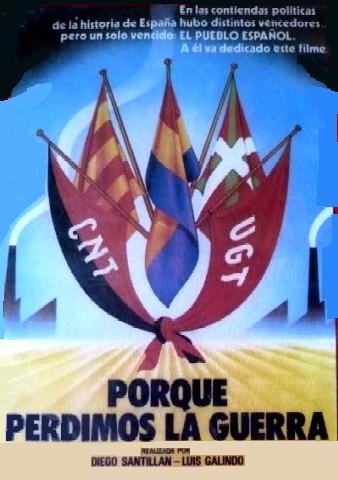
Summarizing the Spanish Civil War
on film is an extremely difficult, if not impossible, task. The war
was more than a simple fight between two disputing sides. It was
the total confrontation between two different conceptions of life:
those who aspire, with slight variations, to continue living in a
world of privileged rulers and a mass of slaves -famished and
emaciated before and fat at present though always slaves
nevertheless- and on the other hand, those who aspire to live in a
better world, more respectable and fairer for everybody.
That eternal struggle of humanity,
more clearly synthesized in our two Spains, so to speak, ended up
in a war that, according to many people now, should be forgotten. I
personally think that one should get to know it first and, after
knowing about it, get over it but without ever forgetting what
happened. Those events that are landmarks in the history of
humanity, in the history of mankind, should never be
forgotten.
In those days there were many who
quickly understood that Spain was heading down a path toward social
change that was different from the well-worn paths that always led
to the same place: a world of rulers and the ruled. A profound
social change, and therefore a genuine and long-lasting
transformation, did not suit anyone. It wasn't in the interest of
the fascist states of the time, nor the so-called western
democracies - not even in that of the newly erected dictatorships
built in the name of the workers. Thus, in this way, everybody;
liberals, fascists, democrats and communists all contributed to the
best of their abilities to ensure that the fighting didn't pave the
way to a true social revolution, brought about the way only real
revolutions can be waged: from bottom up.
It wasn't convenient for the
western capitalist countries because many of them had important
economic interests in Spain. It didn't suit the fascists for
obvious reasons. And it wasn't in the interest of the Soviets for
other paths to be opened other than those devised through the use
of "a ruler and a compass" by the Kremlin hierarchs.
And that which was history; many
think it should be forgotten. A profound change is of no interest
to anyone today either. It doesn't suit the democracies, nor the
fascists disguised as liberalists, nor the Soviets. It would, and
is, only of interest to the people. But the people don't count. The
people have never counted.
That is what the film "Por qué
perdimos la guerra" (Why We Lost the War) has tried to show and
condemn. To condemn the passivity of the democracies and Stalin's
double game, for he was more interested in an agreement with
fascism than a victory of the Spanish people. This became a reality
as events led to the sinister German-Soviet pact - an agreement
that was soon broken, though not by the Russians but by the German
fascists who started the war against Russia.
"Por qué perdimos la guerra" will
be criticized on many accounts. For instance, it will be said that
it isn't an objective film. And I agree because in fact it isn't.
It is a totally biased movie. It is biased in the first place
because it is on the side of those who lost the war and have never
had a chance to tell their story. There is no doubt that history is
told by the winners or by those who enjoy the consent of the
winners, or -in the most extreme cases- by a few who were on the
side that lost but have the means to make propaganda about their
past deeds or to erase the treasons that were committed, through
silence No. Nobody should look in "Por qué perdimos la guerra" for
an impartial and objective version of that horrible war of ours. It
is the version of those who lost, the big losers - the Spanish
people. After all, I too can ask: What do you mean by an objective
and impartial version of the Spanish Civil War?
t will also be said that it is an
anarchist film. It isn't. I am not an anarchist myself. I am just a
non-conformist. And nonconformity is the natural condition of man,
the indispensable condition for evolution to occur. If
nonconformity as a natural condition of man is anarchism, it is
worth taking into account and studying. But at least for the time
being, the two concepts don't figure as synonyms.
Many things will be said about the
film, but none of them will be too important. The Spanish Civil War
is history. But history is a step into the future. And the future
is now…or just around the corner.
DIEGO SANTILLÁN.